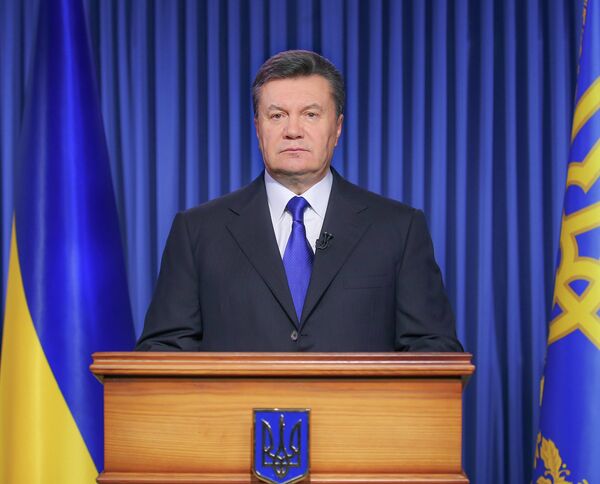KIEV, February 21 (RIA Novosti) – Ukrainian President Viktor Yanukovych on Friday announced an early presidential election and a return to an earlier constitution in concessions aimed at finding an end to the bloody political crisis gripping the country.
Earlier in the day, Yanukovych met with opposition leaders and signed a document intended to end the unrest.
The country’s parliament has already granted a central demand of the opposition and approved a bill to restore the 2004 constitution, designed to limit presidential powers and make Ukraine a parliamentary republic.
“Constitutional reform balancing the powers of the president, the government and parliament will start immediately and be completed in September,” reads the English version of the reconciliation agreement.
A presidential election will be held once the new constitution is adopted, but no later than December.
A national unity government will be formed by March 3.
In a sign of further concessions to the opposition, the parliament voted to relieve hawkish Interior Minister Vitaliy Zakharchenko of his duties and adopted a bill decriminalizing charges on which former Prime Minister Yulia Tymoshenko was sentenced to seven years in prison in 2011.
The measures were agreed in nightlong negotiations with opposition leaders that were overseen by a group of EU envoys, lawmakers and a Kremlin-appointed mediator.
“I am announcing steps needed to restore peace and avoid further victims of the standoff,” Yanukovych said in a national address.
“There are no steps we should demur from taking together in order to restore peace to Ukraine,” he said, calling his decision a duty to the people of Ukraine and his country.
Udar party leader Vitali Klitschko, a former champion boxer, said earlier in the day that the opposition was ready to sign the deal with the government but needed to consult with street activists first.
Less than an hour later, the German Foreign Ministry said on its official Twitter page that the coordination council of activists based in Independence Square had approved the reconciliation plan.
The agreement between the government and the opposition coincided with the withdrawal of riot police from an area in downtown Kiev where most government buildings are located, including the parliament, the Cabinet of Ministers and the presidential administration.
Authorities and opposition have traded accusations over who instigated the latest round of violence, which erupted Tuesday after a crowd marched toward the parliament intent on storming the building.
Fighting between radical anti-government protesters and police has claimed at least 80 lives over three days, according to the Interior Ministry.
The violence in Ukraine is the worst the nation has seen since it gained independence in 1991.
Under Friday’s reconciliation deal, an investigation into this week’s acts of violence will be jointly monitored by the authorities, the opposition and the Council of Europe.
The agreement also introduces a 24-hour amnesty for protesters willing to hand in illegally obtained firearms to the police.
The country has declared a nationwide mourning on Saturday and Sunday.
“After the aforementioned period, all cases of illegal carrying and storage of weapons will fall under the law of Ukraine,” the agreement says.
Mass protests initially erupted in late November after the government backed away from deals to deepen political and economic cooperation with the European Union and instead opted for closer ties with Russia.
Although discontent was at first focused on that about-face move on EU ties, protests have since taken on a more general anti-government quality, calling for the president’s ouster and early elections.


